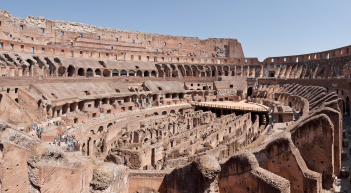There was no district of Rome's Empire which had not been the scene of some recent campaign. None had suffered more than Italy herself. Its old stock of freemen, who had cultivated its fair plains and terraced vineyards, was utterly worn out. The general depopulation of Rome's territories was badly compensated by the establishment of military colonies. Inordinate wealth and slave factories were the prominent features.
This disastrous condition was not confined to Italy. In some respects Rome's provinces had their own peculiar sufferings. For example, take the case of Asia Minor. It had been plundered and ravaged by successive generals, by Scipio in the war against Antiochus of Syria and by Manlius in his Galatian campaign. It had also been plundered by Pompey in the struggle with Mithridates. The rapacity of governors and their officials followed that of Rome's generals and their armies.
We know what Cilicia suffered under Dolabella and his agent Verres. The Roman politician Cicero reveals to us the oppression of his predecessor Appius in the same province, contrasted with his own boasted clemency. Some portions of this beautiful and inexhaustible country revived under the emperors. But it was only an outward prosperity. Whatever may have been the improvement in the external details of provincial government, we cannot believe that Rome's governors were gentle and forbearing, especially when Caligula was on the throne or when Nero was seeking statues for his golden house.

The contempt in which the Greek provincials themselves were held by Rome may be learnt from the later correspondence of the Emperor Trajan with Pliny the governor of Bithynia. We need not hesitate to take it for granted, that those who were sent from Rome to dispense justice at Ephesus or Tarsus were more frequently like Appius and Verres, than Cicero and Flaccus.
It would be a delusion to imagine that, when the world was reduced under one Roman sceptre, any real principle of unity held its different parts together. The emperor was deified, because men were enslaved. There was no true peace when Augustus closed the Temple of Janus. Rome's Empire was only the order of external government, with a chaos both of opinions and morals within.
The writings of Tacitus and Juvenal remain to attest to the corruption which festered in all ranks, alike in the senate and the family. The old severity of manners, and the old faith in the better part of Rome's religion, were gone.
The licentious creeds and practices of Greece and the East had inundated Italy and the West. The Pantheon was only the monument of a compromise among a multitude of effete superstitions. It is true that a remarkable religious toleration was produced by this state of things. It is probable that for some short time Christianity itself shared the advantage of it. But still the temper of the times was essentially both cruel and profane, with even the Apostles soon exposed to Rome's bitter persecution.
Rome's Empire was destitute of that unity which the Gospel gives to mankind. It was a kingdom of this world full of its own wreckage; and the human race were groaning for the better peace of "a kingdom not of this world."